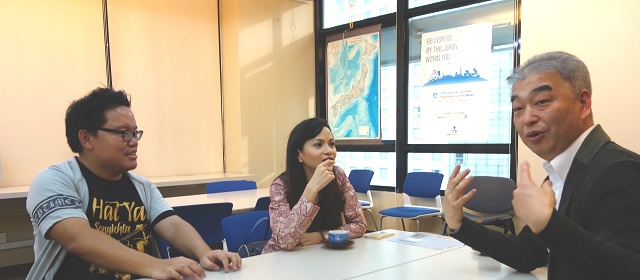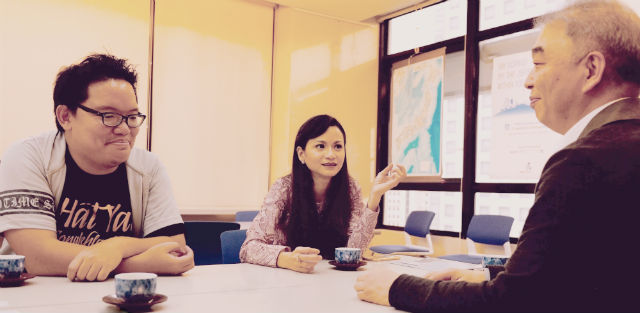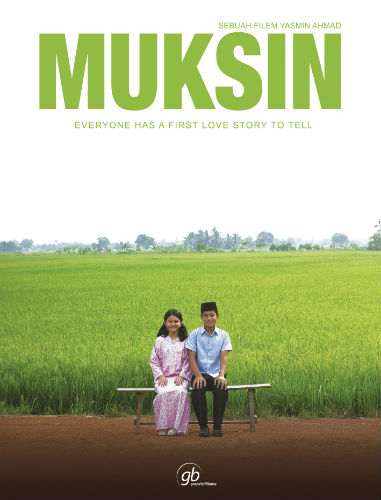What Yasmin Taught Us
Ishizaka: I also heard that you are interested in directing.
Sharifah: Very much. I've actually been trying to write my first feature film from eight years ago. When I was with Yasmin in Japan, preparing for Wasurenagusa, I told her that I wanted to be a director and wanted to tell stories. She just looked at me and said, "You!? You don't know anything about life. You're too young. What story do you want to tell?" That's how she is; when she is figuring you out, she first wants to see exactly how much you want to do it, how passionate you are. Now looking back, I realize that while I was very blessed in life, I didn't really live my life to the fullest; at that point, I had not lost anybody whom I loved and nothing, say, traumatic had happened to me. But then Yasmin suddenly passed away, so now I know how it feels to lose a person very close to you.
Ishizaka: I read the script for Wasurenagusa in Japanese, and I thought it is a very difficult film to realize. It's Yasmin's very personal, subjective story. I mean, it would be wonderful if we can somehow materialize it into a film but….

Sharifah: For me, Wasurenagusa is a project that is very close to me; I was there from the birth of the idea, went location scouting for it, auditioned with Japanese boys, and also met the very famous actor, Mr. Fuji Tatsuya. So I really would love to see it become a film but I also don't think there is anybody who can do it; or do it properly. I'm afraid there aren't many people who truly understand the story and can portray it the way it is supposed to be.
Edmund: If it's going to be ruined, it's probably better to not be released at all.
Sharifah: Maybe. According to Yew Leong, Yasmin's husband, she actually didn't want to make the film. That was apparently her last wish. I still don't know why. But since I'm her "daughter," I'm going to respect her wishes and listen to her. Although, it would be wonderful if we can somehow use the script for educational purposes; little bits here and there for young storytellers to learn how Yasmin wrote stories and to break them down. Maybe we can then make a short film based on little excerpts from the idea of Wasurenagusa. That way, maybe we can continue her legacy through the themes Yasmin explored in Wasurenagusa, and if we do it as filmmakers but also as her loyal fans, I think it would be all right. But to make the film itself? I don't think so. It's a sacred script now, so it's not something I can or want to play around with either.
Yasmin Ahmad Seen from Edmund Yeo's Eyes
Ishizaka: Edmund, did you have a chance to meet with Yasmin before?
Edmund: No, never. The only time I spoke to her was on the phone in 2007 when I went to Japan. I was helping Woo Ming Jin—that was my first job with him—and we were doing a tele-movie and trying to look for actors. Ming Jin suggested I call Yasmin if she could recommend any handsome actors. So I called her and said, "Hi, I'm Edmund Yeo and I'm working for Woo Ming Jin on a tele-movie and he suggested I call you to ask if you could recommend a good, handsome actor. Could you help us out?" Yasmin replied, "Oh, but that's very subjective," and I said, "It is, but how about someone who is handsome enough that you can objectively appreciate him?" to which she replied, "Let me think about it." And that was it [smiles].
Sharifah: That was it? She didn't back to you?
Edmund: No [laughs].
Sharifah: That's very "Yasmin." She's very busy, so you can't get a hold of her unless you chase her [smiles].

Edmund: When Sepet won the Best Asian Film Award in Tokyo, I was studying in Australia. I saw the film on the plane, either when I was flying home or back to Australia. It was a time when there were many Malaysian directors appearing overseas.
Ishizaka: As a talented filmmaker yourself, how do you evaluate Yasmin and her films? Which one is your favorite?
Edmund: I think Mukhsin is my favorite. That was when she was at her best, I think.
Sharifah: That's my favorite, too.
Ishizaka: In 100 Asian Films, a publication by the Busan International Film Festival in 2015 on the best Asian films, the Yasmin film that ranked the highest was Mukhsin, wasn't it.

Edmund: The first film I saw on the big screen was Mukhsin, too. And it was the film that brought Ming Jin and I together, which was in 2007. So it means a lot to me. My first job after I came back from Australia was with a director who is a friend of Ming Jin's. I suggested to him, "Let's go watch the new Yasmin Ahmad film Mukhsin," and he said, "Ok, let me call my other director friend, Ming Jin, to come and join us." So that's how we met. Ming Jin and I started talking and just hit it off. He said, "We should work together," and that's how it all started; through Mukhsin in 2007.
- Next Page
- The Malaysian New Wave: Past and Present






